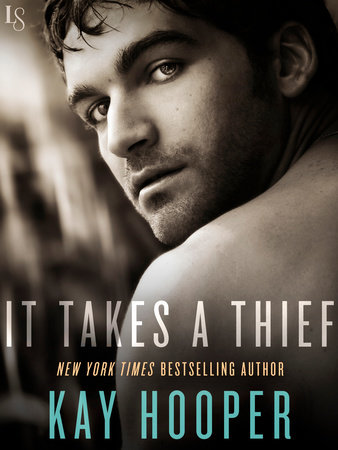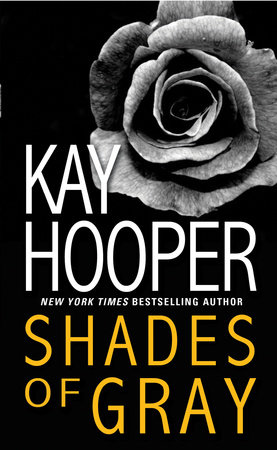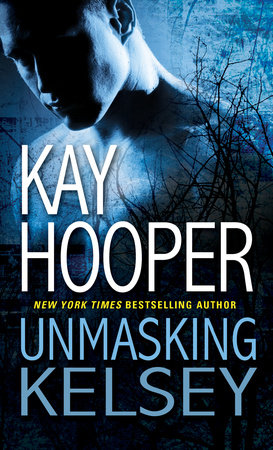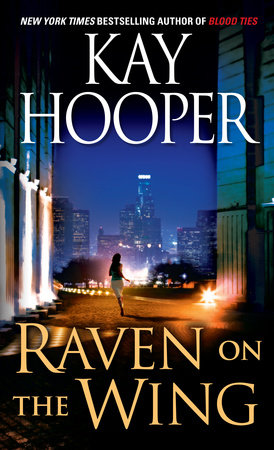Excerpt
Outlaw Derek
One
Derek Ross struggled up through the heavy layers of jet-lag exhaustion with an awful buzzing in his ears. Rolling over in a tangle of bedclothes, he started to reach for the phone on the nightstand, but then recognized the sound he heard. Sitting up instead, he raked his fingers through his hair.
The door. In the middle of the night. No. He looked blearily at the clock on his nightstand. At four a.m. A visitor? Even in exhaustion, his mind automatically considered and rejected possibilities of felonious intent. It wasn’t likely. In general, the guys in the black hats didn’t lean on door buzzers to announce their arrival, especially at four in the morning, when stealth tended to be a prime consideration.
He kicked the blankets away and got up, finding his jeans in the darkness and struggling into them to the accompaniment of a few sleepy curses. He turned on lights as he made his way through the apartment to the front door, and, when he reached it, said in a voice little more than a growl, “Yeah, what?”
“Mr. Ross? I need to talk to you.”
Standing well to one side of the still-closed door, Derek frowned. A woman whose voice he didn’t recognize. In his business, that tended to be a bad sign. He realized that he had tensed. “It’s four o’clock in the morning,” he said shortly. “Who are you, and what do you want?”
“Mr. Ross, please, I--I have to see you. It’s very important.”
Derek hesitated, then leaned forward cautiously so that he could look through the security peephole. He was taking a chance, because the door was composed of only a few flimsy layers of plywood, which wouldn’t stop a bullet or even withstand a well-placed kick. His view through the tiny hole was distorted, but he saw enough to make him relax--if only a bit. “Hold your hands where I can see them,” he said curtly.
Outside in the well-lit hallway, the woman held both hands up at shoulder height, palms out toward him. She didn’t seem surprised by his extreme caution, but then, she was obviously too distraught to be surprised by anything.
“Keep them up,” he said, and drew back away from the door as he unlocked and opened it. Instantly, the woman came into the apartment, her hands still held at shoulder height. Derek closed and relocked the door.
“I’m not armed,” she said softly.
He was reasonably sure of that; it was why he had relaxed. The silk dress she wore clung like a second skin and left little to the imagination. She couldn’t have hidden a bullet under the garment, much less a gun. But he hadn’t lived to be thirty-five by being reckless or taking unnecessary chances, so he kept his distance while watching her intently. “All right. Into the den, straight ahead.”
Following her, Derek observed thoughtfully that her walk didn’t fit the dress. She had the carriage of an athlete or dancer, fluid and graceful in spite of an obvious limp. The dress, on the other hand, was designed to emphasize curves and wiggles, in fact to make it nearly impossible for a woman to walk in it without wiggling. She managed, however, despite the limp; the slight sway of her hips was utterly feminine, but in no way exaggerated.
Still seductive as hell, though.
She stopped by the couch, continuing to hold her hands as he’d instructed. “Can--can I sit down?”
Derek circled slowly until they faced each other. “I don’t know,” he said dryly. “Can you?”
She blinked, then glanced down at the bright red skintight sheath. A flush lightly colored her pale face. “Oh. I haven’t sat down since--well.”
“Try,” he invited her.
She did, gingerly. And managed the feat, although the strapless bodice might have slipped downward half an inch or so. An unconscious relief filled her expression as the weight was removed from her legs. Slowly, she lowered her hands until they twined together in her lap.
For a long moment, they studied each other in silence. She saw a big man, barefooted and beard-stubbled, his wheat-gold hair tousled and a thick mat of golden hair covering his powerful chest. He had very dark and lazy eyes and a way of standing that was seemingly relaxed and negligent, but gave an impression of latent strength casually under control. And he had a face that would fascinate women and artists, because it was starkly male, diamond-hard, and utterly beautiful, even though he was obviously very tired.
He saw a young woman somewhere in her twenties, of medium height and slender in a way most women wanted to be and few were; she was full-breasted, her hips curved gently, and there wasn’t an ounce of excess flesh anywhere. Her hair was a rich dark brown with red highlights, falling past her shoulders in a thick mass of loose curls. Her face was heart-shaped and delicate, and she had large eyes so light brown they were almost amber, eyes with haunting shadows of pain. She looked lovely, fragile, gentle . . . and scared. Scared to death.
“Who are you?” he asked abruptly.
“Shannon.” Her gaze flickered. “Brown.”
“Well, it’s better than ‘Smith,’ I suppose.”
“It’s my name, Mr. Ross.”
He let it go. “And how do you happen to know mine?”
“I--someone gave me your name.”
“Who?”
She worried her lower lip with small white teeth for a long moment. “I was told not to mention his name if I could help it.”
“There’s the door,” Derek told her politely.
Her eyes seemed to grow larger. “He said you were hard,” she murmured. “Tough without having to act like it. But he said you’d help me if I ever needed help. I need help.”
“Who?” Derek repeated.
She sighed. “William Franklin.”
“Governor Franklin?”
“Yes. He--over a year ago, he gave me your name. He said you could be trusted, no matter what the problem. And he said you were very good at what you do.”
“Did he happen to mention what I do?” Derek asked, no expression at all in his deep voice.
Her eyes flickered, then steadied on his face. “He said you were sort of a troubleshooter. For different government agencies sometimes and freelance sometimes. He said that you take care of problems, any kind of problems. He said . . .”
“What?” Derek asked when her voice trailed into silence.
Very softly, she said, “He told me you could be a--a bastard when you wanted to, but you were honest. And that you weren’t afraid of anything.”
Derek shook his head. “That sounds like him.” He remembered several years back when a blackmail threat had almost cost Franklin his political career. Looking intently at Shannon “Brown,” he said slowly, “The governor’s happily married, or was the last time I saw him. What are you to him?”
“He’s a friend.”
“Uh-huh.”
Her chin lifted and the big eyes flashed gold. “He was right,” she said in a shaking voice. “You can be a bastard!”
Very dryly, Derek said, “Look, Miss Brown, mine isn’t a name that people like governors hand out to casual acquaintances. If Franklin gave you my name a year ago, it was either because you and he are very, very close, or else because he knew you were in some kind of trouble, or likely to be, and it was the kind that required my brand of problem solving. Which is it?”
She bit her lip. “All right, then. We are close, but not the way you obviously think. He’s my uncle.”
Derek sat down in a chair, relaxing in a boneless manner that was totally deceptive. “Blood uncle?” His face indicated nothing, neither belief nor disbelief.
“Yes.”
“You just wrote a new chapter in science.”
She blinked. “What--what do you mean?”
“Franklin’s an only child. So’s his wife. Try again.”
Shannon slumped, and her lips twisted in a painful little grimace. “I don’t want to lie. But you won’t believe it was innocent--”
“Try me.”
After a moment, she nodded. “All right. I worked on his campaign, that’s how we met. I was just another campaign worker at first. But then I--I got hurt. Anyway, he’s a kind man, and he felt sorry for me. After the campaign, he got me a job with Civatech. Do you--?”
“I know of Civatech. High-security firm. They have an in-house think tank and an unsurpassed record at designing and manufacturing electronic toys for the military to play with. And your job?”
“Secretary, receptionist. I have a low-level security clearance: I don’t work with highly classified information. I just type correspondence, answer the phone. That sort of thing.”
Derek was frowning. “So you’ve been with Civatech about eighteen months?” He waited for her nod. “I gather Governor Franklin keeps in touch with you?”
She nodded again. “A call now and then. And he invites me to private parties he and Annie have.”
“Does he ask about your work?”
Her chin lifted. “He didn’t put me at Civatech to spy for him, if that’s what you’re implying. There’s no reason he should have: Civatech usually contracts with the military, not state government. William wouldn’t--”
“I didn’t say he would,” Derek Ross interrupted mildly. “In fact, I’m reasonably sure he wouldn’t. I’m just trying to put this together. Why did he give you my name?”
She hesitated, staring at him, then appeared to make up her mind. “About a year ago, while I was having dinner with William and Annie, I mentioned that some of the letters I’d been typing seemed odd. I’m a good typist, and I read what I type instead of just scanning the words. If you know what I mean?”
“Yes.”
“Two or three of the letters bothered me, because they didn’t seem to make sense to me. It was nothing definite, just a sentence here and there that seemed out of place. I mentioned it to William.”
“What was his reaction?”
It was impossible to tell whether Derek believed her or not, but she didn’t let doubt throw her off balance. “He seemed a little puzzled at first. Then he was more bothered by it. A couple of weeks later, he asked me if there had been any more letters like that. I said no. That was when he told me about you. He made it--conversational. We were alone in the room, and he was offhand about it, even laughing. He said you’d helped him out of some trouble once, and that you were very good at what you did. He said if I was ever in trouble, I should tell you all about it.”
“It didn’t surprise you that he should talk that way?”
“Yes. Oh, yes. But he was so casual. And I could tell he didn’t want me to ask questions, so I didn’t.” She hesitated, then added, “Several times these last months if no one could overhear, he’d ask kind of teasingly if I remembered who to go to if I needed help. I’d say your name, and he’d say, ‘Don’t forget it.’ So I didn’t forget.”
After a moment, Derek rose abruptly and left the room. He returned seconds later with a light blanket, which he dropped around Shannon’s bare shoulders. “You look frozen,” he said somewhat gruffly. “Coffee?”
“Please,” she said gratefully, drawing the blanket around her. She got up and followed him into the kitchen, beginning to feel less cold in more ways than physically. There was something comforting, she thought, in the mere presence of this man. He was hard and blunt and suspicious, but there was something infinitely understanding in his eyes, tolerant, as if nothing she or anyone could ever say would surprise him, and she felt safe for the first time in hours.
He didn’t seem to find it surprising that she followed him, merely gesturing for her to sit on one of the low stools at the breakfast bar. “How did you find my apartment--the phone directory?”
“Yes. William said you kept a listed phone number, even though you shouldn’t.”
Derek got the coffee started, then leaned back against the counter and studied her silently and quite openly. There was a package of cigarettes and a lighter on the counter, and he reached for them without looking, lighting a cigarette while continuing to look intently at her.
“You . . . you do believe me?” she asked.
Without answering that, he said, “No purse, no coat or wrap of any kind. A dress that would get you arrested if you stood on the right corner--and especially if you stood on the wrong one. And you’ve done a hell of a lot of walking in shoes not designed for that. So tell me what happened in the last ten hours or so that brought you to my door at four a.m.”
Shannon hugged the blanket tighter around her body and took a deep breath. “Today--yesterday--just before five, I took one of those odd letters to my supervisor. It was odd in a different way from the others; it was referring to a design that was scrapped months ago, and discussed the shipment of the finished product, which was a prototype, to a foreign company I couldn’t find listed in our computer, or in the city where it was supposedly based.”
“Two suspicious items,” Derek mused. “A supposedly nonexistent product shipped to a nonexistent company. What did your supervisor say about it?”
“That he’d look into it. He seemed impatient, and I was afraid he’d dismiss it without checking, so I mentioned the other odd letters.”
Derek half closed his eyes and nodded. “Uh-huh. So you very honestly told him about things you should never have noticed. And I suppose all these odd letters came from the same source?”
Shannon nodded. “From Civatech’s director of design, Adam Moreton.”
“Do you always take care of his correspondence?”
“No. Only when his private secretary is sick.”
He nodded. “Okay. So what happened then?”
“I went home to my apartment.” Her face went completely white then, and her eyes looked enormous. “There was a party I was supposed to go to, and I went by a friend’s house first to change into this dress; it’s hers and she wanted me to wear it. I walked to my apartment from her place to finish getting ready, and unlocked the door. I had just pushed it open when my landlady called me from the first floor to tell me she’d signed for a package. I went to get the package. It was from my mother,” she added inconsequentially.
After a moment, Derek said quietly, “What happened after you went downstairs?”
She looked at him blindly. “The explosion . . . knocked me down as I was coming back up the stairs . . . everything was bright . . . when I got up . . . and hot . . . and the apartment--my apartment--was just gone. . . .”
Derek turned to jab his cigarette into an ashtray on the counter before reaching into a cabinet and pulling out a bottle of whiskey. He poured a small amount into a glass, then stepped to her side. “Drink this.”













